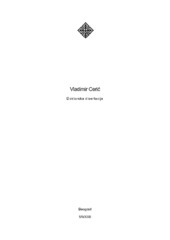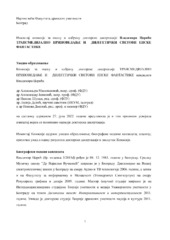| dc.contributor.advisor | Daković, dr Nevena | |
| dc.contributor.other | Milovanović, dr Aleksandra | |
| dc.contributor.other | Janković, dr Aleksandar | |
| dc.contributor.other | Delić, dr Lidija | |
| dc.contributor.other | Šuica, dr Nikola | |
| dc.creator | Cerić, Vladimir | |
| dc.date.accessioned | 2022-06-27T08:48:18Z | |
| dc.date.available | 2022-06-27T08:48:18Z | |
| dc.date.issued | 2022-10-10 | |
| dc.date.issued | 2022-10-10 | |
| dc.date.submitted | 2022-06-27 | |
| dc.identifier.uri | http://eteze.arts.bg.ac.rs/handle/123456789/570 | |
| dc.description.abstract | Sažetak Transmedijalno pripovedanje predstavlja savremenu, kreativnu i otvorenu praksu koja se koristi u širokom spektru izlaganja pripovesti, od dramskih umetnosti do industrija zabave i marketinga, ali i obrazovanja. Od uvođenja u svakodnevnu upotrebu, ovaj pojam je više puta redefinisan elementima remedijacije, adaptacije, ekstenzije ili krosmedije, naročito kada se u praktičnoj primeni koristi u cilju kreiranja dijegetičkog sveta/sveta priče. Zadati okvir čitanja teksta, svet priče, takođe je podložan preformulaciji. Nedostatak idealnih primera transmedijalnog pripovedanja predstavlja poziv za redefinisanje i otvaranje pojma ka srodnim praksama. Dodatni problem predstavlja i nedostatak literature koja definiše epsku fantastiku. Imajući navedeno u vidu, cilj ove teze bio je da utvrdi odnosno potvrdi da li je transmedijalno pripovedanje pogodno za stvaranje kompleksnih dijegetičkih svetova/svetova priče i da ostvaruje svoj pun potencijal – kreiranje složenih pripovesti u rastućem, kompleksnom i koherentnom svetu fikcije kakva je epska fantastika. U cilju analize različitih medijskih tekstova i platformi korišćeni su deskriptivni, analitičko-tekstualni, komparativni, statistički, induktivni i deduktivni metod, a u teorijskom okviru transmedijalnog pripovedanja, naratologije, sveta priče, teorije prostora, transfikcije, žanra i participativne kulture. Istraživački proces podrazumevao je detaljno proučavanje svih tekstova koji čine transmedijalni svet Igre prestola. Primenom teorija žanra, kroz studiju slučaja je potvrđeno da Igra prestola ima status epske fantastike, uprkos stalnom odlaganju eukatastrofe i čestog korišćenja diskatastrofe koje otvaraju neobično veliki broj zapleta. Zbog brojnih inovacija koje su utvrđene u tretmanu narativnih linija, netipičnog statusa heroja, kao i kompleksnosti osnovnog teksta, ovaj korpus tekstova čini svet priče posebno pogodnim za visok stepen uranjanja. Analiza je pokazala da je detaljno razrađen svet priče idealan za dalje transmedijalno širenje. Uzimajući u obzir sve navedeno, izuzetan uspeh Igre prestola mogao bi da dovede do rasta broja sličnih projekata epske fantastike u budućnosti, dok teorijski okvir, dat u ovom radu, može predstavljati strategiju transmedijalnog pripovedanja i za druge tekstove epske fantastike i druge žanrove | en |
| dc.description.abstract | Abstract Transmedia storytelling is a contemporary, creative and open practice used in a wide range of storytelling, from the dramatic arts to the entertainment and marketing industries and education. Since its introduction into everyday use, this term has been redefined many times, with elements of remediation, adaptation, extension, or cross-media, primarily when practically used to create a diegetic world/storyworld. The given framework for reading the text, the storyworld, is also subject to reformulation. The absence of ideal examples of transmedia storytelling calls to redefine and open the concept to related practices. The next problem is the lack of literature that defines epic fantasy. Having this in mind, this thesis aims to determine/confirm whether transmedia storytelling is suitable for creating massive diegetic worlds/storyworlds. Moreover, achieving its full potential in creating complex narratives in a growing, complex and coherent world of fiction, such as epic fantasy, which was analyzed in the case study of the Game of Thrones series and derived texts. For this purpose, methods of analysis of various media texts and platforms such as descriptive, analytical-textual, comparative, statistical, inductive, and deductive methods were used, all through the theoretical framework of transmedia storytelling, narratology, storyworld, spatial theory, genre and participatory culture. The research process involved a detailed study of all the texts that make up the transmedia world of the Game of Thrones. By applying genre theories, a case study confirmed that Game of Thrones has the status of a subgenre of fantasy - epic fantasy, despite the constant postponement of eucatastrophe and frequent use of discatastrophe, which opens a vast number of plots. Due to numerous innovations identified in the treatment of narrative lines, the atypical status of the hero, and the massiveness of the primary text, this corpus of texts makes the storyworld especially suitable for a high degree of immersion. The analysis showed that a complex storyworld is ideal for further transmedia expansion. Considering all the above, the remarkable success of Game of Thrones could lead to the growth of similar epic fantasy projects in the future. At the same time, the theoretical framework given in this paper may represent a transmedia storytelling strategy for other epic fantasy texts and other genres. | en |
| dc.language.iso | sc | en |
| dc.publisher | Универзитет уметности у Београду, Факултет драмских уметности | sr |
| dc.source | Факултет драмских уметности | sr |
| dc.subject | transmedijalno pripovedanje, epska fantastika, svetovi priče, Igra prestola | en |
| dc.subject | transmedia storytelling, epic fantasy, storyworld, Game of Thrones. | en |
| dc.title | TRANSMEDIJALNO PRIPOVEDANJE I DIJEGETIČKI SVETOVI EPSKE FANTASTIKE | en |
| dc.type | doctoralThesis | en |
| dcterms.abstract | Даковић, др Невена; Миловановић, др Aлександра; Делић, др Лидија; Шуица, др Никола; Јанковић, др Aлександар; Церић, Владимир; | |


